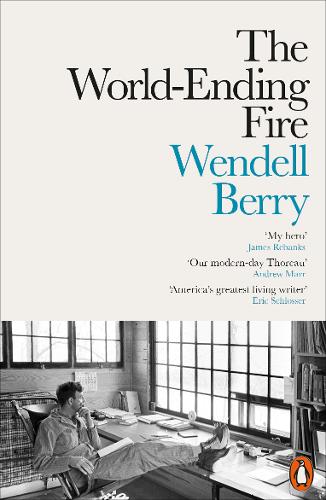
I had never heard of veteran U.S. writer Wendell Berry. Then, in the space of a single month, I encountered three separate references to his work in works by other people I very much admire. Taking this as a good omen, I decided to give him a try.
I wish I could say I loved this book. Berry seems like the sort of chap I would enjoy meeting. Indeed, I very much enjoyed some of the essays is this collection. Berry is a talented writer with a distinctive voice. Early on, I found myself highlighting passages that struck me as particularly well expressed. For example:
There is also the Territory of historical self-righteousness: if we had lived south of the Ohio in 1830, we would not have owned slaves; if we had lived on the frontier, we would have killed no Indians, violated no treaties, stolen no land. The probability is overwhelming that if we had belonged to the generations we deplore, we too would have behaved deplorably. The probability is overwhelming that we belong to a generation that will be found by its successors to have behaved deplorably. Not to know that is, again, to be in error and to neglect essential work, and some of this work, as before, is work of the imagination. How can we imagine our situation or our history if we think we are superior to it?
Thought-provoking stuff. But, a short way into this book, and things started to grate. Some of the early chapters were pretty repetitive. This might be the fault of the editor of the collection, the writer Paul Kingsnorth, but I suspect not: Wendell Berry has a number of hobby-horses, and he will keep climbing on them: the importance of soil, land-use, self-sufficiency, and local communities; and the evils of consumerism. Nothing much to disagree with it here, but what started to grate was Berry's writing from a mostly unacknowledged highly privileged position: there are almost 8-billion people on this planet, and most of them, unlike Berry, can never hope to grow their own crops and raise their own livestock on their own private smallholdings, supported by a strong and vibrant local community.
Berry's rather blinkered views on the best way to sort out the undoubted mess we've made of our home planet grated all the more with his scorn for the idea of big problems requiring big solutions. He clearly distrusts modern science and technology, and seems to relish expressing Luddite views.
On a related topic, what also irked was Berry's use of a particular wily rhetorical device when making an argument. He likes to coin new phrases to encompass, as he sees them, different sets of people or world-views (e.g. ‘the Rational Mind’ versus ‘the Sympathetic Mind’). He then discusses how these newly coined groups are either misguided (those he disagrees with), or enlightened (those who think like him). This is a devious device because, as he has coined the new terms, we, his readers, are not in a position to question what, if anything, they mean, nor which sets of people or world-views, if any, they truly encompass. Berry has, in effect, defined his own straw-men, which, as we might expect, he easily demolishes.
I genuinely expected to love this book, and felt guilty not enjoying large sections of it. I even found myself skipping to the end of certain essays when they began to irritate far more than they should. Perhaps I just read it at the wrong time, when I wasn't in the mood, and a re-reading in a few years' time might find me less tetchy. But somehow I suspect not.
- Buy this book from Bookshop.org (UK) and help tax-paying, independent bookshops.
- Buy this book from Amazon.co.uk
- Buy this book from Amazon.com